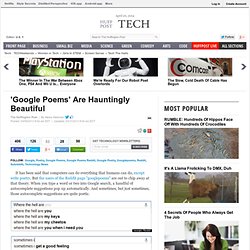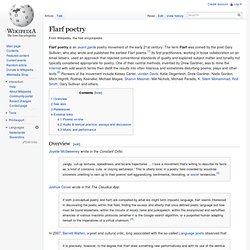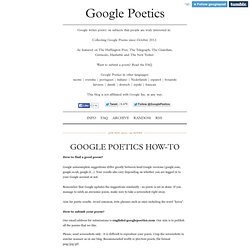

4 Reasons to Start Class With a Poem Each Day. For each school day of the past three years, I've started my ninth-grade English class with a poem.

When I first made this commitment, I feared that I might not have the stamina (or enough engaging poems) to sustain us for the full 184 days of class. And I wasn't the only skeptic. Each year, I get a few sideways glances and furrowed brows when I explain our daily opening routine for class. But before long, students are starting English class with Billy Collins and Mary Oliver and Robert Pinsky, Rumi and Basho and Shakespeare. These voices, contemporary and classic, have helped define my classroom culture to such an extent that on the rare occasion when I postpone the “Poem of the Day” until later in the class period, my students interrogate me about it.
So if this year's National Poetry Month inspires you to give daily poetry a go in your classroom, maybe even just for the month, consider these four reasons why starting class with a poem each day will rock your world. 1. 2. 3. 4. Poetry lesson plans for secondary teaching. Poets.org - Poetry, Poems, Bios & More.
Printable: Dream Big Poem. Google is a poet. 'Google Poems' Are Hauntingly Beautiful. It has been said that computers can do everything that humans can do, except write poetry.

But the users of the Reddit page "googlepoems" are out to chip away at that theory. When you type a word or two into Google search, a handful of autocomplete suggestions pop up automatically. And sometimes, but just sometimes, those autocomplete suggestions are quite poetic. We tried my hand at some Google poetry and it's really not as easy as it looks. More often than not, the autocompletes are uninteresting.
Check out some of our Google poetry below: Loading Slideshow 'Everybody Is..'' Poet - Google-søgning. Flarf poetry. Overview[edit] Joyelle McSweeney wrote in the Constant Critic: Jangly, cut-up textures, speediness, and bizarre trajectories … I love a movement that’s willing to describe its texts as ‘a kind of corrosive, cute, or cloying awfulness.’

This is utterly tonic in a poetry field crowded by would-be sincerists unwilling to own up to their poems’ self-aggrandizing, sentimental, bloviating, or sexist tendencies.[3] Joshua Clover wrote in the The Claudius App: If both (conceptual poetry and flarf) are compelled by what we might term impoetic language, flarf seems interested in discovering the poetic within that field, finding the excess and alterity that once defined poetic language but now must be found elsewhere, within the circuits of ersatz fame and junkspeech, within the anonymized and reshuffled errancies of various machinic protocols (whether it is the Google search algorithm, or a purported human adapting herself to the imperatives of a virtual chatroom. [4] See also[edit] References[edit]
Poetry Tours. The Poetry Station. World Poetry Day collection. Last Updated:12 March, 2013Section:Resources World Poetry Day, established by Unesco in 1999, is a chance to reflect on the power of language and to support linguistic diversity through poetic and creative expression.

The day offers endangered languages around the world the chance to be heard within their communities and, closer to home, to celebrate poetry in all its forms. Take a look at our fabulous collection of free teaching resources on poetic devices, assemblies, metaphors, poems and celebrated poets. Early Years Nursery rhymes 49 nursery rhymes grouped under various themes, such as transport, food and minibeasts.
Minibeast rhymes Poems, rhymes and songs about insects and other small creatures. Space songs and poems Let their imaginations blast off with poetry inspired by space. This is the bear… Ask pupils to suggest the rhyming words to finish each line of the poem. Teddy bear poems Poems and rhymes about bears of the teddy variety. Make a rhyme Write a nursery rhyme Peepo! I love fruit. Google Poetics how-to. How to find a good poem?

Google autocomplete suggestions differ greatly between local Google versions (google.com, google.co.uk, google.it…). Your results also vary depending on whether you are logged in to your Google account or not.Remember that Google updates the suggestions constantly - no poem is set in stone. If you manage to catch an awesome poem, make sure to take a screenshot right away.Aim for poetic results. Avoid common, trite phrases such as ones including the word “lyrics”.How to submit your poem? Our email address for submissions is english@googlepoetics.com. Please, send screenshots only - it is difficult to reproduce your poem.